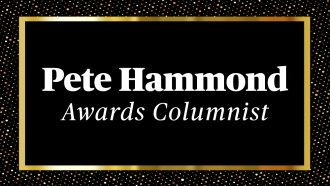EXCLUSIVE: The Academy Museum of Motion Pictures has been celebrating the 75th anniversary of The Actors Studio with special screenings and in-person conversations on Sunday nights in August and September. Of course, the studio is the thespian mecca and home to so many in the profession looking to hone their craft and work out their approach to their art. The guru teacher most associated with it was the great Lee Strasberg, and it even had its own long-running TV series Inside The Actors Studio in which so many stars came back to share secrets of success that had to much to do with the teaching of Method acting, or at least that was how it was labeled.
Not every actor is a fan of the “Method,” and just this week there was a trade headline straight out of a Toronto Film Festival panel where Succession star Brian Cox minced no words, blasting Method acting as “American Sh**”. Whoa. Them’s fighting words to many actors, including Sally Field.
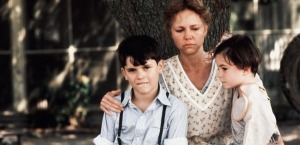
Sony Pictures
The Academy Museum’s tribute to the Actors Studio brought out the likes of Al Pacino, Robert De Niro, Ellen Bursty and coming up this Sunday none other than two-time Best Actress Oscar winner Field, who will celebrate the 75th anniversary recounting her own history at the Actors Studio in a conversation that will precede a screening of one of those films that earned her the Academy Award: 1984’s Places in the Heart. Of course that win led to her delivering one of the most famous of all Oscar acceptance speeches, the one where she exclaimed in near-tears, “You like me!”
Who doesn’t like Sally Field? When I hopped on the phone with her this week I discovered how she was able to do the rare transition from a non-trained actor doing TV sitcoms early in her career like Gidget (which she loved) and The Flying Nun (not so much) to a two-time Oscar- and three-time Emmy-winning star. But interestingly it was none other than that flying nun role that proved her entry into The Actor’s Studio and a life-changing experience.
We talk about it, that Oscar speech, and her visceral reaction to Cox’s opinion of the acting Method she swears by.
DEADLINE: So in a weird way it was The Flying Nun, even with all the stigma that went with it for you, that led to the life- and career-changing decision to join The Actors Studio?
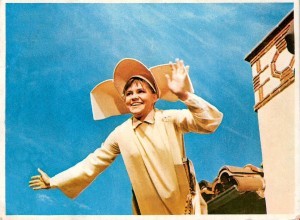
Sony
FIELD: Certainly it was a very troubled time in my life and acting had always been my only connection to me, because I was raised in the ’50s a little girl that was supposed to be all these supposed-to-be things, and I had kind of troubles in my own family and I was so shut down from who I genuinely was. And the only way I could hear myself was when I was on stage, and that I found in seventh grade. And then when I actually got into a professional situation Gidget was me. So I never sat down during the day because I wanted to know “what are you doing?” and “what is this?” And it was the most unbelievably joyous experience. And then I was slammed into The Flying Nun where everything came to a screeching halt. It was no longer in any form acting, nothing was real, and probably batted up against my young adulthood and I was seriously depressed. And Madeleine Sherwood, the Mother Superior (on Flying Nun), bless her heart, who had been a longtime Actors Studio member and very much advocate of it, she put a piece of paper in my hand and said be there. She was a serious friend of mine forever and she said “I’ll be there, I’ll be waiting for you,” and I certainly was a very inward and shy person, didn’t have a lot of social goings-on anywhere. I made myself do it. I never even had like a schooling experience outside of high school. So going into an environment like that was very new. It profoundly changed my life because within a short matter of time, I met Lee [Strasberg] and I began to work with Lee very seriously for many years. And it was very, very, very instrumental in who I became ultimately as an actor.
DEADLINE: Yes, recently I heard Ellen Burstyn talking about it, and how now even about to turn 90, it is still a key part of her life and work.
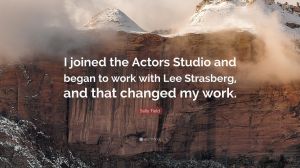
FIELD: Yeah. Oh, there’s no question it’s how I work and it’s just ingrained now. You know the Actors Studio or, in quotes, “method,” isn’t anything like this bad rap that it has accumulated. That isn’t what it is. That’s just called bad acting. That’s really not the Method. That’s not what Lee taught. And I also had the great good fortune in my life to work with Marty Ritt (director of Norma Rae, Murphy’s Romance) And Marty had been a part of the Group Theatre which is what it was called before the Actors Studio. He was good friends with Elia Kazan. And before that Cheryl Crawford and Bobby Lewis, who I ultimately worked with also later on. … So he was part of the Actors Studio from the inception. His language was what I knew. It was what Lee’s language was, and finally I had a shorthand into all of the tools, a juggling act, an emotional juggling act that Lee taught so magnificently. He was an extraordinary teacher. I don’t know that there has ever been one quite like him or ever will be. There are other people that went through various other forms of acting. From what I’ve heard of them they weren’t this. To do the work well you really had to know yourself. He invited, and sort of demanded, that you find your own pieces, as I say in my book (In Pieces, which came out in 2018). That is what an actor is. It is revealing yourself through other characters that are written by somebody else. It doesn’t mean that each character is totally and completely you, but they are aspects. They’re a tiny, tiny part of you that maybe you aren’t comfortable using, or hadn’t used a long time, or didn’t know was there, and they’re bringing the character alive through you.
DEADLINE: Exactly. Yesterday I saw a headline in the trades where Brian Cox (Succession) was at the Toronto Film Festival and it said he “blasted Method acting as ‘American Sh**’, but as I read further even though he criticized Method, he was essentially saying, “I just act and as an actor the character must live through you.” Isn’t that the same thing?
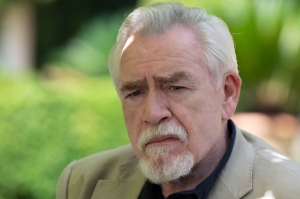
Graeme Hunter/HBO
FIELD: That is what I am talking about. That’s it, and Brian who I do know and I’ve worked with a tiny tiny little minute in time, but he is English and they have no understanding of what this Method is, because they felt offended by it. And it is very much what that is, except Lee taught tools because he said your emotional self will shut down if you’re literally coming at it front force and saying, “I’m going to feel sad.” … You’ll be faking it, you’ll be going for a result as they say, because you have it in your head that sadness is this, and that is what Brian is saying. I mean, Brian is this really talented man. He might be going into it and might be doing this very thing (Method), and not quite. I needed to have the information. I needed to know those tools, that I knew I was actually using a tool. I’ve always been the person that wanted to know, you give me the actual rules and then I’ll let them go. And that’s what Lee taught. He would say, “Not everybody needs this, you don’t need to do this. You don’t need to do these exercises for every role. If it works just to pretend, then just pretend.” Lee would say that. … I think what Brian is talking about is people not knowing, they are either not knowing what the method is or not knowing how to use it, or not using it as the case may be. … I think Brian should just keep his mouth shut. I’ll be in an act-off with him (she laughs), and let’s see how many characters he can do.
DEADLINE: That is something I would line up to see.
FIELD: I do adore him though. He’s the most wonderful actor.
DEADLINE: In your book In Pieces you wrote about a very intense and kind of frightening confrontation you had with Strasberg. But in the end it turned out to be a good thing for you?
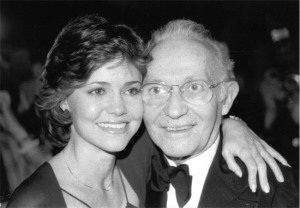
newyorksocialdiary.com
FIELD: He was so nurturing to me, I tried to count up the years (with him) and it was probably all in almost 10 years. Maybe not quite. And all that time I was trying to bash in the wall. They wouldn’t let me even be on a list to audition. At that time in the ’70s no one wanted me. These people in film wanted nothing to do with with situation comedy television, right? It was like, “No, no, no.” You can see that there were some men who graduated from television into film, but they were all in hour-long dramas like James Garner, Steve McQueen or Clint Eastwood, but you name the women? There aren’t any. Lucille Ball was already an established movie star before she became this comedic icon, and even then she had a very hard time going backwards, and going back in successfully. But so to get in the door, I had to just say to myself, “It isn’t them. It’s me.’ I couldn’t blame them, “all those big bad thems, look what they were doing to me.” No, it was me. It was that when I was good enough I would get in the door and it would change everything. So all of these years I’ve worked with Lee to understand the craft, to just constantly be doing it, it was second nature, and I came to be kind of cocky and I would be on stage doing a scene and everybody sort of thought of me as “Lee’s pet.” He spent time with me and it mattered so greatly to me.
DEADLINE: So then things blew up with Lee when you were up on stage at Actors Studio and you had a scene where, uh oh, you had to play a nun?
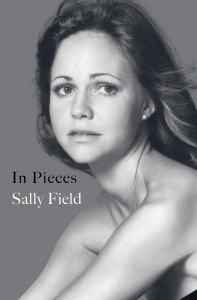
FIELD: So one day I had to do a scene I didn’t really want to do but if you had a classmate who asked, you kinda had to do it. And yeah (laughing) the part was a nun so already this wasn’t gonna be too great for me. So I wasn’t really concentrating very much and I was sort of showing off and doing some fancy footwork and kind of working on something but not really. Afterwards he talked to my partner first, addressing what she’s working on, and he was very kind and I thought “Okay, good.” Well, I’m very cocky and he turned to me and said, “When are you going to stop doing this sh*t?” And I went, “What?” And he just laid in to me. He asked me what I was working on and I was working on my father, and he said “then I don’t believe that your father means anything,” and I just went nuts, something in me snapped. I would not care if somebody shot me. I was just so hurt and angry. And I was just screaming at him, “Who the f*ck do you think you are? Who the f*ck do you think you are?” And everybody in class sort of slunk down. Nobody did this to Lee, I mean nobody. People were hiding their faces. He stood up and he was all red in the face. He was an older guy. And he started screaming back at me, “Listen to me, listen to me, listen to me.” And he came up to the stage and put his hands on the apron of the stage to steady himself. And he said, “Listen to me. All this time you come in here and you do the same stuff over and over again. Listen to me. Where you want to be is where you are right now.” And he kept saying it over and over, and I said “What the holy f*ck does that mean?” The class was over and I left, and I was destroyed. And I picked myself up and my shirt was all wet from crying, it was a disaster. And I never entered a classroom situation with him again which was tragic.
DEADLINE: And that was it with you and Lee Strasberg?
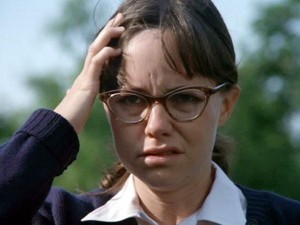
FIELD: But very shortly after that, it was like the Gods were listening. I had this opportunity to audition, only the second audition I’ve ever been on. I had had an opportunity to audition for a film before that which I got that was Stay Hungry. It was the same casting director, and she brought me back, but again no one wanted me in there, they thought that (casting director) Dianne Crittenden was wasting their time, no one wanted anything to do with me. And I just had to keep my head down. I knew I was right for this part. I knew this was mine without even knowing clearly all the reasons it was, and I did get it after coming back again and again and again being so full-out Sybil (for which she won her first Emmy), but I got it and when I was halfway shooting it I was so exhausted and so frightened that my own psyche was never going to come back. I had so put myself in this place. And I had to go in and work and I was so tired. And the director said to me, “Sally do you want to stop for today and we’ll come back and try to do it tomorrow?” And I realized where I was was exactly where I needed to be. And that I was so tired, I could barely function. And I realized it was Lee’s words. And I wrote him: “Lee, I understand now. I didn’t know what you meant. You were saying that to be excellent it has to cost something, it has to not necessarily be fun. You have to pay a cost. I understand, and thank you.” After that I saw him lots and lots of times for various events and things and I was able to talk to him about the work he was able to see me do, Stay Hungry, Sybil. He died before he could see me in Norma Rae, which I would have loved for him to see. But, yeah.
DEADLINE: Places in the Heart is obviously a movie that meant a great deal too, and of course it led to you giving one of the most memorable Oscar acceptance speeches of all time when you won your second Academy Award for Best Actress — the first being Norma Rae five years earlier. The line I so remember was when you said, “I didn’t feel it the first time.” What did that mean?
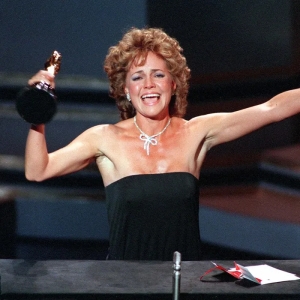
FIELD: Yes I did say that. The first time with Norma was such a shock from the moment that an audience saw it, which was in Cannes. And the reaction to it and I won the Palme d’Or (for Best Actress there) and I could almost not feel anything for that whole awards season. And luckily those award seasons then in those days, I’m sure you know, weren’t anything like they are now. They were very much more subdued. But still I couldn’t quite feel it, and when I won the [Oscar] I was so numb. It was so hard to get there, so hard. I had been, and I felt I was a nationwide joke in The Flying Nun. But you know lots of people come up to me and say “I loved The Flying Nun. I loved The Flying Nun.” I say, “That’s good. I don’t really understand why you did, but that’s okay.” I was 19, 20 and 21 and it was just not where I wanted to be. So it just was a battle that I didn’t know that I would really win. So I said to myself. “If I ever get here [the Oscars] again, I am going to own it. I am going to do it. I am going to let it be mine.” So that is how that happened.
Places in the Heart preceded by a conversation with Field takes place Sunday at 7:30 p.m. at the Academy Museum of Motion Pictures.

